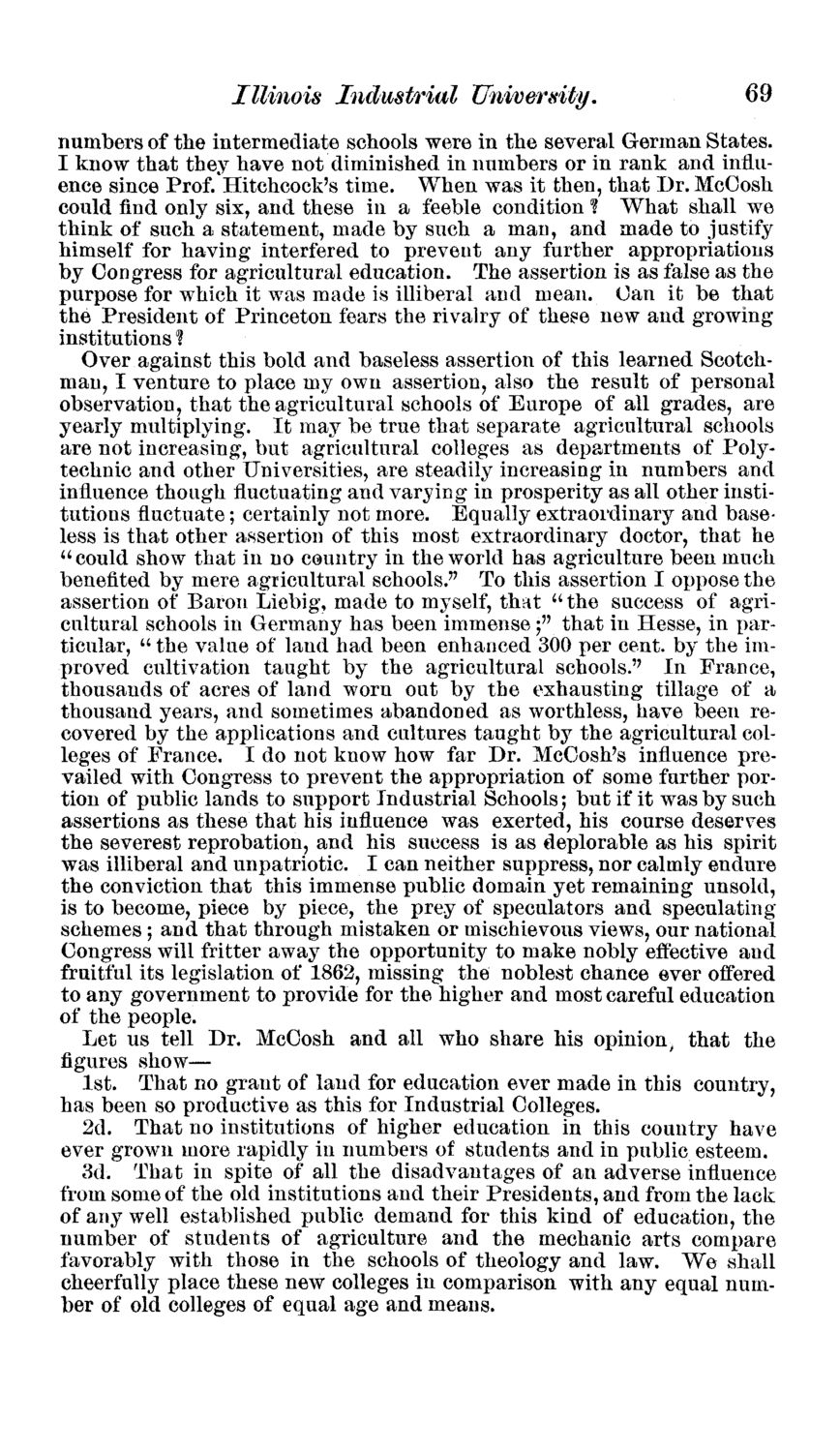| |
| |
Caption: Board of Trustees Minutes - 1874
This is a reduced-resolution page image for fast online browsing.

EXTRACTED TEXT FROM PAGE:
Illinois Industrial University. 69 numbers of the intermediate schools were in the several German States. I know that they have not diminished in numbers or in rank and influence since Prof. Hitchcock's time. When was it then, that Dr. McOosh could find only six, and these in a feeble condition % What shall we think of such a statement, made by such a man, and made to justify himself for having interfered to prevent any further appropriations by Congress for agricultural education. The assertion is as false as the purpose for which it was made is illiberal and mean. Can it be that the President of Princeton fears the rivalry of these new and growing institutions! Over against this bold and baseless assertion of this learned Scotchman, I venture to place my own assertion, also the result of personal observation, that the agricultural schools of Europe of all grades, are yearly multiplying. It may be true that separate agricultural schools are not increasing, but agricultural colleges as departments of Polytechnic and other Universities, are steadily increasing in numbers and influence though fluctuating and varying in prosperity as all other institutions fluctuate; certainly not more. Equally extraordinary and baseless is that other assertion of this most extraordinary doctor, that he "could show that in no country in the world has agriculture been much benefited by mere agricultural schools." To this assertion I oppose the assertion of Baron Liebig, made to myself, that "the success of agricultural schools in Germany has been immense f that in Hesse, in particular, " the value of land had been enhanced 300 per cent, by the improved cultivation taught by the agricultural schools.'* In France, thousands of acres of land worn out by the exhausting tillage of a thousand years, and sometimes abandoned as worthless, have been recovered by the applications and cultures taught by the agricultural colleges of France. I do not know how far Dr. MeCosh's influence prevailed with Congress to prevent the appropriation of some further portion of public lands to support Industrial Schools; but if it was by such assertions as these that his influence was exerted, his course deserves the severest reprobation, and his success is as deplorable as his spirit was illiberal and unpatriotic. I can neither suppress, nor calmly endure the conviction that this immense public domain yet remaining unsold, is to become, piece by piece, the prey of speculators and speculating schemes; and that through mistaken or mischievous views, our national Congress will fritter away the opportunity to make nobly effective and fruitful its legislation of 1862, missing the noblest chance ever offered to any government to provide for the higher and most careful education of the people. Let us tell Dr. McCosh and all who share his opinion > that the figures show— 1st. That no grant of land for education ever made in this country, has been so productive as this for Industrial Colleges. 2d. That no institutions of higher education in this country have ever grown more rapidly in numbers of students and in public esteem. 3d. That in spite of all the disadvantages of an adverse influence from some of the old institutions and their Presidents, and from the lack of any well established public demand for this kind of education, the number of students of agriculture and the mechanic arts compare favorably with those in the schools of theology and law. We shall cheerfully place these new colleges in comparison with any equal number of old colleges of equal age and means.
| |